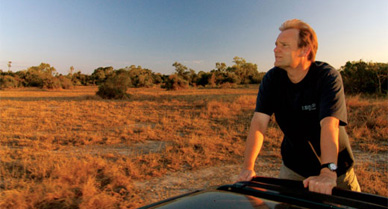
"I had the idea at 25 that if I made a lot of money, I could do whatever I wanted," says the Boston entrepreneur. And so, in one of the largest private commitments in African conservation, he's putting 40 million into a spectacular national park in war-ravaged Mozambique.
The children come running as soon as the boat pushes onto the riverbank, mooring next to empty handmade fish traps. Greg Carr is at the front of the group of visitors clambering ashore. He lifts one child into the air, makes a face at another and greets adults with backslapping familiarity. Carr, an eager American with khaki pants and a Boy Scout's smile, has spent a lot of time in Mozambican villages like this one over the past three years, wooing officials and local elders alike in the hot, red dust for their support.
In the 1990s, Carr made millions of dollars in high technology, developing voice-mail services for the emerging Baby Bell phone companies. Now, he is risking millions in an effort to revive a national park, a once-heralded place of sweeping savannas and velvety green wetlands called Gorongosa, across the river from this village.
His project ranks as one of the largest individual commitments in the history of conservation in Africa. To restore Gorongosa, he has pledged as much as $40 million over 30 years, an almost unheard-of time frame in a field where most donors—governments and nonprofit organizations alike—make grants for four or five years at most. He also plans one of the largest animal reintroduction efforts on the continent and hopes to answer one of the most debated questions in conservation today: how to boost development without destroying the environment. He believes a restored park will lift this beleaguered region out of poverty.
And he believes his success depends on the help of this village, Vinho, and others like it.
Abstract of an article by Stephanie Hanes, originally published in the May 2007 issue of SMITHSONIAN. All rights reserved.
Click here to read full article.



